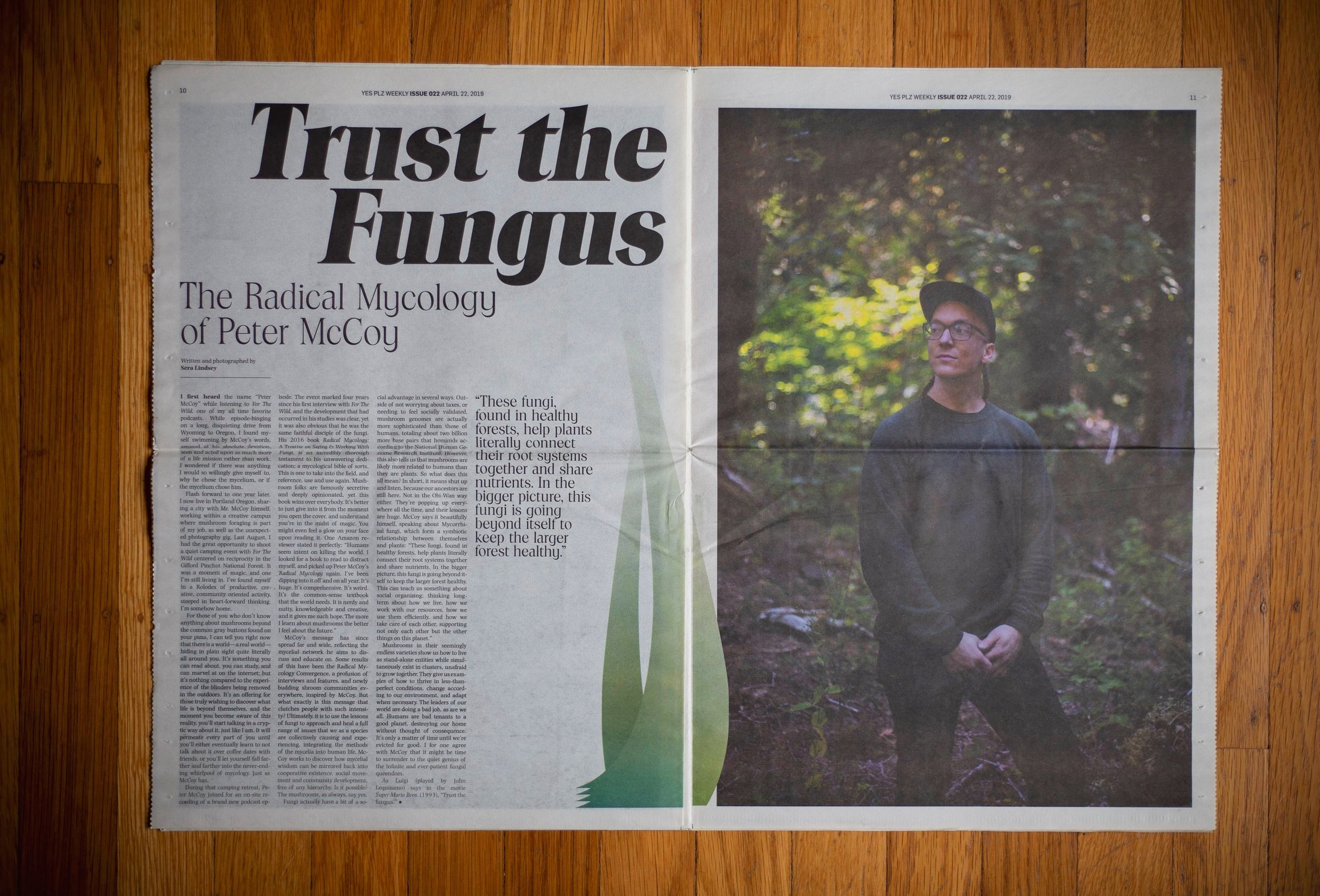I first heard the name "Peter McCoy" while listening to For The Wild, one of my all time favorite podcasts. While episode-binging on a long, disquieting drive from Wyoming to Oregon, I found myself swimming in Peter's words, amazed at his absolute devotion; seen and acted upon as much more of a life mission rather than work. I wondered if there was anything I would so willingly give myself to - why he chose the mycelium, or if the mycelium chose him. Flash forward to one year later. I now live in Portland Oregon, sharing a city with Mr. McCoy himself and working within a creative campus where mushroom foraging is part of my job. Last August, I had the great opportunity to shoot a quiet camping event with For The Wild centered on reciprocity in the Gifford Pinchot National Forest. It was a moment of magic; one which I'm still living in. I've found myself captured within a rolodex of productive, creative, community oriented activity, steeped in heart-forward thinking. I'm somehow home.
For those of you who don't know anything about mushrooms past the common gray button slices found on your pizza, I can tell you right now that there is a world - a real world - hiding in plain sight quite literally all around you. It's something you can read about, you can study, and can marvel at on the internet; but it's nothing compared to the experience of the blinders being removed in the outdoors. It's an offering for those truly wishing to discover what life is beyond themselves, and the moment you become aware of this reality, you'll start talking in a cryptic way about it, just like I am. It will permeate every part of you until you'll either eventually learn to not talk about it over coffee dates with friends, or you'll let yourself fall farther and farther into the never-ending whirlpool of mycology. Just as Peter has.
During this camping retreat, Peter McCoy joined for an on-site recording of a brand new podcast episode. The event marked four years since his first interview with For The Wild, and clearly displayed the development that had occurred in his studies- yet he has been the same faithful disciple of the fungi. His 2016 book Radical Mycology: A Treatise on Seeing & Working With Fungi, is an incredibly thorough testament to his unwavering dedication; a mycological bible, of sorts. This is one to take into the field to use and use again. Mushroom folks are famously secretive and deeply opinionated, yet this book wins over everyone. It's better to just give into it from the moment you open the cover, and understand you're in the midst of magic. You might even feel a glow on your face upon reading it. One Amazon reviewer stated it perfectly: "Humans seem intent on killing the world. I looked for a book to read to distract myself, and picked up Peter McCoy's Radical Mycology again. I've been dipping into it off and on all year. It's huge. It's comprehensive. It's weird. It's the common-sense textbook that the world needs. It is nerdy and nutty, knowledgeable and creative, and it gives me such hope. The more I learn about mushrooms the better I feel about the future."
Peter's message has since spread far and wide, reflecting the mycelial network he aims to discuss and educate on. Some results of this have been the Radical Mycology Convergence amongst others, a profusion of interviews and features, and newly budding ‘shroom communities everywhere, inspired by McCoy. But what exactly is this message that clutches people with such intensity? Ultimately, it is to use the lessons of fungi to approach and heal a full range of issues that we as a species are collectively causing and experiencing, integrating the methods of the mycelia into human life. McCoy works to discover how mycelial wisdom can be mirrored back into cooperative existence, social movement and community development, free of any hierarchy. Is it possible? The mushrooms, as always, say yes.
Fungi actually have a bit of a social advantage in several ways. Outside of not worrying about taxes or needing to feel socially validated, mushroom genomes are actually more sophisticated than human genomes, totaling in at about 2 billion more base pairs that us hominids*. However, this also tells us that mushrooms are likely more related to humans than they are plants. So what does this all mean? In short, it means shut up and listen, because our ancestors are still here. Not in the Obi-Wan way, either. They’re popping up everywhere all the time, and their lessons are huge. Peter says it beautifully himself, speaking to Mycorrhizal fungi, which form a symbiotic relationship between themselves and plants:
"These fungi, found in healthy forests, help plants literally connect their root systems together and share nutrients. In the bigger picture, this fungi is going beyond itself to keep the larger forest healthy. This can teach us something about social organizing; thinking long-term about how we live, how we work with our resources, how we use them efficiently, and how we take care of each other, supporting not only each other but the other things on this planet."
Mushrooms, in their varieties, show us how to be individual as stand-alone entities while simultaneously existing in clusters (sometimes close, sometimes far away), unafraid to grow together. They give us examples of how to thrive in less than perfect conditions, change according to our environments, and adapt when necessary. The leaders of our world are doing a bad job, as are we all. Humans are bad tenants to a good planet, destroying our home without thought of consequence. It's only a matter of time until we're evicted for good. I for one agree with Peter that it might be time to surrender to the quiet genius of the infinite and ever-patient fungal queendom. As Luigi says in the Super Mario Bros movie, "trust the fungus."
*National Human Genome Research Institute
Shot and written for Yes Plz Magazine, 2019

